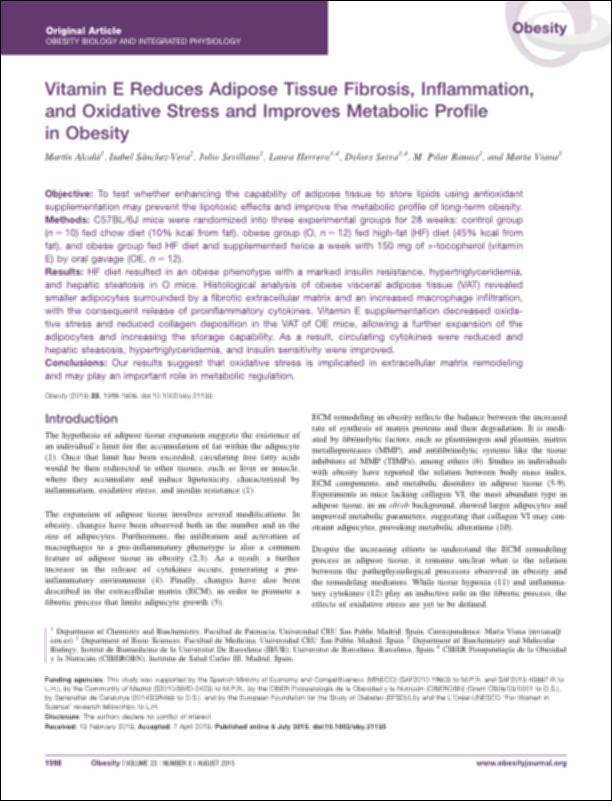Please use this identifier to cite or link to this item:
http://hdl.handle.net/10637/14498Vitamin E Reduces Adipose Tissue Fibrosis, Inflammation, and Oxidative Stress and Improves Metabolic Profile in Obesity
| Title: | Vitamin E Reduces Adipose Tissue Fibrosis, Inflammation, and Oxidative Stress and Improves Metabolic Profile in Obesity |
| Authors : | Alcalá Díaz-Mor, Martín Sánchez-Vera Gómez-Trelles, Isabel Herrero Rodríguez, Laura Serra, Dolors Ramos Álvarez, María del Pilar Viana Arribas, Marta |
| Keywords: | Ipotoxic; Metabolic profile; Adipose tissue |
| Publisher: | Obsesity Journal |
| Citation: | Alcalá M, Sánchez-Vera I, Sevillano J, Herrero L, Serra D, Ramos MP, Viana M. Vitamin E reduces adipose tissue fibrosis, inflammation, and oxidative stress and improves metabolic profile in obesity. Obesity (Silver Spring). 2015 Aug;23(8):1598-606. doi: 10.1002/oby.21135. Epub 2015 Jul 6. |
| Abstract: | Objective: To test whether enhancing the capability of adipose tissue to store lipids using antioxidant supplementation may prevent the lipotoxic effects and improve the metabolic profile of long-term obesity. Methods: C57BL/6J mice were randomized into three experimental groups for 28 weeks: control group (n510) fed chow diet (10% kcal from fat), obese group (O, n512) fed high-fat (HF) diet (45% kcal from fat), and obese group fed HF diet and supplemented twice a week with 150 mg of a-tocopherol (vitamin E) by oral gavage (OE, n512). Results: HF diet resulted in an obese phenotype with a marked insulin resistance, hypertriglyceridemia, and hepatic steatosis in O mice. Histological analysis of obese visceral adipose tissue (VAT) revealed smaller adipocytes surrounded by a fibrotic extracellular matrix and an increased macrophage infiltration, with the consequent release of proinflammatory cytokines. Vitamin E supplementation decreased oxidative stress and reduced collagen deposition in the VAT of OE mice, allowing a further expansion of the adipocytes and increasing the storage capability. As a result, circulating cytokines were reduced and hepatic steasosis, hypertriglyceridemia, and insulin sensitivity were improved. Conclusions: Our results suggest that oxidative stress is implicated in extracellular matrix remodeling and may play an important role in metabolic regulation. |
| URI: | http://hdl.handle.net/10637/14498 |
| Rights : | http://creativecommons.org/licenses/by-nc-nd/4.0/deed.es openAccess |
| ISSN: | 1930-739X |
| Issue Date: | 6-Jul-2015 |
| Center : | Universidad San Pablo-CEU |
| Appears in Collections: | Facultad de Farmacia |
Items in DSpace are protected by copyright, with all rights reserved, unless otherwise indicated.


